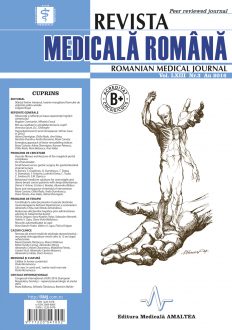SELECT ISSUE

Indexed

| |

|
|
|
| |
|
|
|

|
|
|
|
|
|
|
HIGHLIGHTS
National Awards “Science and Research”
NEW! RMJ has announced the annually National Award for "Science and Research" for the best scientific articles published throughout the year in the official journal.
Read the Recommendations for the Conduct, Reporting, Editing, and Publication of Scholarly work in Medical Journals.
The published medical research literature is a global public good. Medical journal editors have a social responsibility to promote global health by publishing, whenever possible, research that furthers health worldwide.
Behavioral medicine solutions for overweight and obese breast cancer patients with sleep disturbances
Alexandru Blidaru, Cristian I. Bordea and Diana V. Artene
ABSTRACT
Sleep disturbances overthrow breast cancer patients’ eating behavior, aggravating sarcopenic obesity causes like insulin, leptin and dopamine resistance, thus increasing recurrence and mortality risks. Seeking fat loss sollutions for sarcopenic obesity in ER+ breast cancer patients with sleep disturbances, we randomized 50 – of which 16 were depressive – to follow a high protein diet (D) or the diet and sleep journal interventions (D+SJ). Patients ate only when hungry foods naturally high in protein, calcium, omega-3, pre- and probiotics, and were asked to write a daily food journal. Half of the patients were asked to write a 7-day Kalionka Institute type sleep journal – containing questions about the time it took them to fall asleep, number of awakenings during the night, how much they slept, how much they stayed in bed, and self-perceived sleep quality. After writing the sleep journal, we asked patients to follow set sleeping and wake up hours calculated based on their SJ answers, and to not sleep during the day. After 8 weeks we remeasured body composition with a muli-frequency bioelectrical impedance scale. 8 patients from the D+SJ group asked to leave the study, 5 being depressive. D group lost 2.31±2.86% body fat (p=0.001), and 0.76±1.16% visceral fat (p=0.001); with no fat loss difference between patients with or without depression. Depressive patients did not obtain statistically significance for weight loss. D+SJ group improved sleep quality and lost 2.16±2.35% body fat (p=0.002), and 0.86±1.24% visceral fat (p=0.005). Depressive patients didn’t obtain statistically significant results neither for fat, nor for weight loss – maybe because of the overtirying effect of the SJ intervention. So, both D and D+SJ interventions improve breast cancer patients’ body composition despite sleep disturbances, but only non-depressive patients also lose weight. And SJ intervention improves sleep quality in patients without depression, decreasing weight regain risk.
Keywords: breast cancer, sleep disturbances, sarcopenic obesity, body composition, Kalionska Sleep Journal
Full text | PDF
